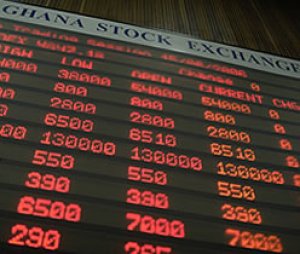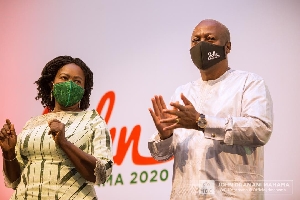Business News of Wednesday, 9 July 2014
Source: B&FT
Investors dote on financial stocks
Investors’ confidence in the continued profitability of financial companies has propped up the performance of their stocks, despite flagging trading on the Ghana Stock Exchange (GSE).
Financial firms made up seven of the 10 most traded stocks on the GSE in the first five months of the year, with three banking stocks in the top-five according to data from the exchange.
CAL Bank, the fourth-biggest local bank by asset-size, was the exchange’s most liquid stock, registering 30 percent of the total trading volume. GCB shares traded a total value of GH¢27.7million, making the stock the largest traded by value.
These trends boosted the GSE Financial Stock Index (GSE-FSI) to a year-to-May return of 13.8 percent, compared to an overall market yield of 8.1 percent.
There are 12 financial firms listed on the 35-member GSE, comprising nine banks, two insurers and an equities-focused investment fund.
Their stocks provided 70 percent of trading activity on the GSE between January and February 2014, the most recent data issued by the exchange revealed. In terms of value, the stocks accounted for 79 percent of trading, registering trades worth GH¢91.4million in the first two months of the year.
Manufacturing stocks, represented by 10 companies, accounted for 10 percent of the trades in the same period at a value of just over GH¢3million.
According to stock analyst at NDK Asset Management, Yaw Adu-Koranteng, financial stocks are benefitting from the high profitability of banks, while on the contrary manufacturing and other sectors like mining are struggling to record healthy numbers.
“We’re in a regime of high interest rates, which is driving banks’ profitability. At the same time, the other sectors are not doing well,” he said.
He added however that while investors have been sticking with the financial sector, confidence in equities generally has weakened due to the serious macroeconomic difficulties underlined by a weak cedi and high inflation.
GSE data show that trading has flagged compared to a year ago. Share volume traded between January-May 2014 was down 25 percent on a year ago, while the value recorded was lower by 20 percent. The 8.1 percent return on the market in May 2014 also compares to a 57.1 percent yield in May 2013.
In all of 2013 the GSE returned 78.8 percent after posting gains of 23.8 percent in 2012. The weak performance this year could well mean the market produces its lowest return in three years.
“Yields on money market instruments, which have less risk, are going up -- and because equities are among the riskiest assets, investors are asking themselves why they should take that high risk on stocks,” Adu-Koranteng said.
Speaking at an annual general meeting in Accra last week, the GSE’s managers were optimistic that planned listings by the Agricultural Development Bank and Africa Atlantic Holdings, an agricultural firm, will energise the market and widen the options for investors.
“Short of anything else, it (adb’s listing) is going to present another opportunity for investors to have another instrument they can invest in. The key thing for the market is to broaden and deepen it. adb is a profitable bank that will add to the depth and breadth of the market,” said Kofi Yamoah, Managing Director of the exchange.
He said the exchange was the second-best performing stock market in Africa after Malawi’s in 2013, riding on the back of companies’ strong results and high demand from institutional investors, especially local private pension fund managers.
Dr. Sam Mensah, who chairs the Governing Council of the GSE, said the buoyant market performance last year impacted positively on the exchange’s bottom line, with the GSE Group --made up of the exchange and its wholly-owned subsidiary, the GSE Securities Depository --recording a surplus after tax of GH¢1.23million, compared to GH¢418,000 in 2012.
He said significant efforts have been made to push forward the plan to integrate the GSE with other stock markets in West Africa.











